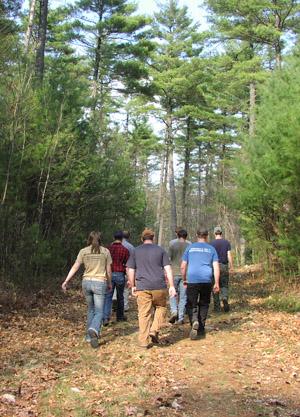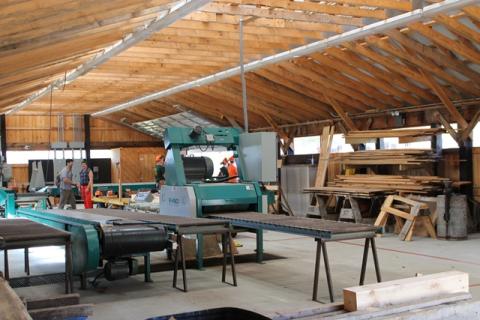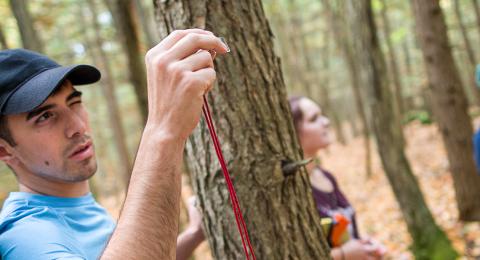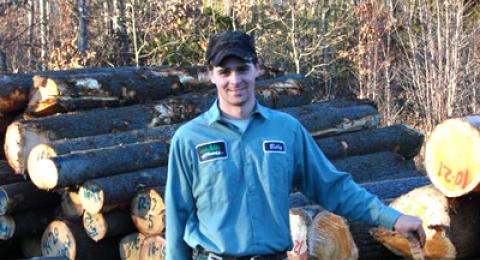The applied forest technology program is no longer accepting new students. We encourage students interested in sustainable management of forests to consider our interdisciplinary forestry degree program.
Explore Program Details
Key Learning Objectives:
Graduates of the Thompson School Forest Technology Program will be able to:
- Identify the flora and fauna of regional forests and understand their role in ecological communities
- Apply the concepts of forest and wildlife ecology to sustainable natural resource management for the benefit of society
- Measure, collect, and analyze field data using appropriate technologies to make sound forest management decisions
- Understand harvesting and processing of forest products
- Navigate in forested settings, and locate and map property boundaries and natural resource features
- Identify land cover types and incorporate spatial data to facilitate forest management
- Identify and evaluate appropriate management strategies in the context of forest insects and pathogens
- Lead field crews to safely and productively accomplish forest management goals
- Communicate effectively and professionally in written and oral formats with clients, related agencies, and the general public
In addition to the Forest Technology-specific FAQs below, check out the general Thompson School FAQ.
As a Forest Technology student, how much time will I spend outside in the forest learning about forestry?
In most of the Forest Technology courses, students spend a large proportion of class time out in the woods learning specific techniques and skills. In general, for every hour of inside lecture, students are outside in the woods for at least two hours.
The Forest Technology program has a Timber Harvesting course, do I need to have previous chainsaw experience for this course?
No, many students do not have previous experience with a chainsaw or harvesting equipment. We provide a safe introduction to timber harvesting, but we are not a logger training and certification program.
I am also interested in the four-year (baccalaureate degree) forestry program, does my coursework in the Forest Technology program count towards a four-year forestry degree?
Yes, we have a 2+2 articulation agreement with the UNH Bachelor of Science in Forestry degree program. This means that after successful completion of the Forest Technology program, students can work towards and complete a four-year forestry degree in as little as two additional years.
As a Forest Technology student, will I be in large classes or small classes?
Students in the Forest Technology program take a mix of program-specific courses and university-wide Discovery courses. As such, students get the experience of being in both large classes with students from many different majors and in small classes that are specific to the Forest Technology program. For the Forest Technology courses (which make up most of the courses Forest Technology students will take) the student to faculty ratio is less than 10:1.

The graduation rate of students working toward a degree over the past ten years averages 78%. Smaller class sizes allow a close watch on the students which helps with their success rates. Most students who do
not make it to graduation leave because they discovered that forestry was not for them. Many of these students transfer into other programs that are more suited to their interests.
The numbers of graduates from the Thompson School who choose to continue on for a baccalaureate degree (either here at UNH or elsewhere) frequently outnumber those entering the job market. This number ranges from 30% to 70%. These students are very successful in this endeavor and usually have a 100% success rate, graduating with their second degree.
Graduation Requirements
The standards for graduation from the Forest Technology program require a minimum of 64 earned credits with a minimum GPA of 2.0 on a scale based on 4.0 as the highest.
The table below shows employment trends for our graduates.
|
EMPLOYMENT TYPE |
PERCENT OF GRADUATES |
EMPLOYMENT TYPE |
PERCENT OF GRADUATES |
|---|---|---|---|
|
Arborist |
18.1% |
Saw Milling/Wood Products |
7.6% |
|
Forestry Consulting/Land Management |
21.9 % |
Government Forester |
10.5% |
|
Wood Procurement |
1.9% |
Fire |
1.0% |
| Timber Harvesting |
13.3% |
Unknown | 25.7% |

Serving the UNH Community as a facility for Research, Education and Sustainable Lumber Production since 1968. All lumber is sustainably harvested from university land by Thompson School of Applied Science students in the Forest Technology program as part of their hands-on curriculum of study.
LOCATION: 248 Mast Road, Durham, NH 03824
CONTACT: andrew.fast@unh.edu










